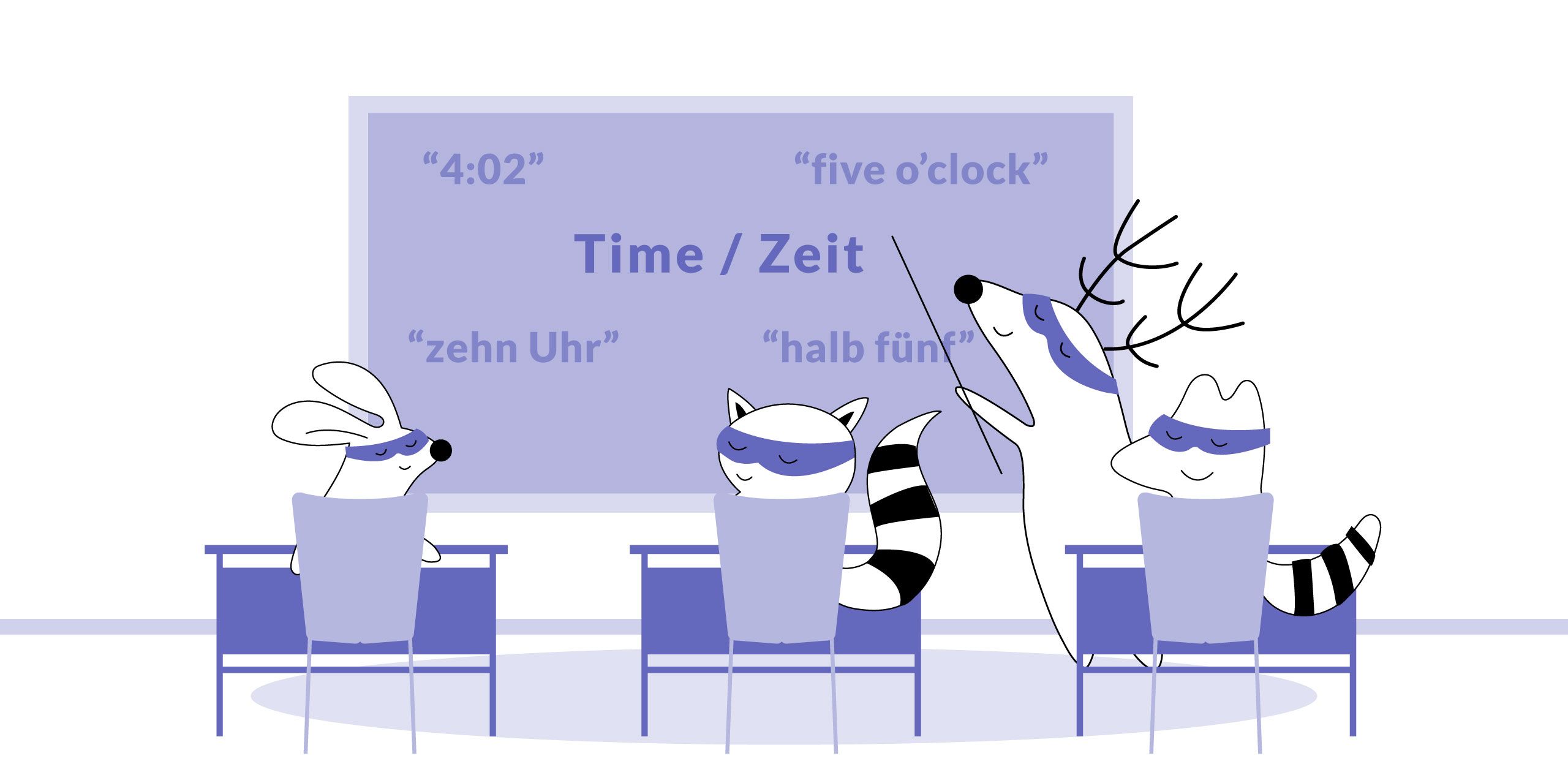
In order to function in a German-speaking country or simply talk in German to other people, it is important to understand the basics of telling time. Not only will it give you the opportunity to make plans or get to the train station on time, but it will also give you some necessary knowledge for determining which grammar tense should be used when.
Fortunately, it is enough to know some key vocabulary words and phrases related to time, as well as understand how to use them in sentences. To help you get the hang of German time words, we have prepared this short guide.
So, check the main rules and exceptions below, get familiar with the examples, and make sure you learn the necessary skill of telling time in German.
Learn German with Langster
How to Ask For the Time in German?
The German word for “time” is Zeit. You'll use this term when talking about::
- Time as a concept (as in “Time is running out”)
- Time of day (in that case, it would be a short form of Uhrzeit)
- Period or era in the past (for example, “In the ancient times…”)
- Grammar tenses (Grammatik Zeitformen)
On the other hand, you won't use Zeit when asking for the time. When you want to ask someone "What time is it?"... you would use either the word Uhr (something like “o’clock”) or spät (which literally means “late”). So, you basically have two expressions you can choose from:
German
English
Wie spät ist es?
What’s the time?, literally “How late is it?”
Wie viel Uhr ist es?
What’s the time?, literally “How many o’clock is it?”
You can also play with them a little by adding the word “now” – and, of course, don’t forget about the German alternative of “excuse me.” A polite and full version would be:
German
English
Entschuldigung, wie spät ist es jetzt?
Excuse me, what time is it now?
Or, you can also rephrase it a bit:
German
English
Wissen Sie, wie spät es jetzt ist?
Do you know what time it is now?
There is also a very formal option that you can use when asking someone on the street for time:
German
English
Entschuldigung, können Sie mir bitte sagen, wie viel Uhr es ist?
Literally: Excuse me, do you have the time?

How to Tell Time in German
Telling time in German is not that different from telling time in
English. You would need to say “It is…”, then the number, and then add the German word Uhr (o’clock) after the number. Make sure you learn the German numbers beforehand!
Remember about that last part: the “o’clock” in the German language, is, unlike in English, mandatory.
For example:
German
English
Es ist ein Uhr.
It is one o’clock.
Es ist zehn Uhr.
It is ten o’clock.
If you need to add minutes, add them after the word Uhr.
German
English
Es ist vier Uhr zwei.
It is 4:02.
Es ist zwei Uhr sechzehn.
It is 2:16.
There is one exception here with the number one. On informal occasions, it is allowed to omit the word Uhr when talking about one o’clock. However, in that case, we use the other word for “one”: eins. So, you can say, for example:
German
English
Es ist eins.
It’s one.
Important Note: 24-Hour Clock
In Germany, people mostly use the 24-hour clock (or military time) for schedules, appointments, signs, and official information. So, don’t be shocked if you hear from someone:
German
English
Es ist fünfzehn Uhr.
It is fifteen o'clock.
Nevertheless, many people still use the 12-hour clock in casual situations, such as talking to friends or classmates. In that case, an alternative to the English “am” and “pm” is used – and it’s as simple as “in the morning” or “at night.” You can choose from a variety of words for specifying the time; here, German is rather flexible.
- Morgens for “in the morning”
- Abends – “in the evening”
- Mittags – “in the afternoon”
- Nachts – “at night”
- Vormittag – “before midday”
- Nachmittag – “after midday”

Rounding Up: Half Past, Quarter Past, and Quarter To
If you’re used to rounding up the time to the half hour in English, there’s good news: in German, you can do the same. Bad news: Germans do it differently.
What would you call this number? 4:30. Yes, “half past four” – or “half four” in British English. In Germany, however, the halves are expressed with the next hour. So 4:30 would be:
German
English
Halb fünf
Half five (literally something like “half of five”)
Fortunately, just saying Es ist vier Uhr dreißig (It is four thirty) still works – in case you can’t get used to the new system fast enough.
But what about quarters? Fortunately, the situation is simpler. There are two alternatives to the English versions:
German
English
Es ist viertel nach…
It is quarter past…
Es ist viertel vor…
It is quarter to…
For example:
German
English
Es ist viertel nach drei.
It’s quarter past three.
Es ist viertel vor vier.
It’s quarter to four.
And, to make your journey of learning German a bit more interesting, there’s one more rounding that German people use: for 25 minutes (to or past). This is the German logic in action – they say it’s “five minutes before/past half hour.”
Let’s see a few examples:
German
English
Es ist fünf vor halb sieben.
It’s five minutes before half past six. (06:25)
Es ist fünf nach halb zwölf.
It’s five minutes after half past eleven. (11:35)
Of course, all of these can make your everyday life in Germany complicated – so if you can’t bear with them, remember that just using regular numbers is also okay.

General German Vocabulary You Need to Know
Knowing how to tell and ask for the time in German is just the basics. To ensure that you can get along with your German friends and understand what time and day each of you is talking about, it’s also necessary to learn some general German words. Here’s a short list:
German
English
vor
before
nach
after or past
um
at (related to time)
gegen
around or “-ish”
heute
today
gestern
yesterday
morgen
tomorrow
Tag
day
Woche
week
Wochenende
weekend
Monat
month
Jahr
year
Morgen früh
tomorrow morning
übermorgen
the day after tomorrow
vorgestern
the day before yesterday
wenn
if, when
als
when (past tense)
Other German Time Expressions
And, in case you want to boost your vocabulary a little bit more, here are some other time expressions that might come in handy when talking to German speakers:
German
English
Letztes Jahr
Last year
Dieses Jahr
This year
Nächstes Jahr
Next year
Nächstes mal
Next time
Bis zum nächsten Mal
Until next time
Lass dir Zeit
Take your time
Es war einmal
Once upon a time
Lange Zeit
A long time
Irgendwann
Sometime
Ab und zu
Occasionally
Mit der Zeit
Over time
Zeitnah
In a timely manner
Telling Time in German is Easy: Just Practice a Bit

Although telling time in German may seem complicated at first, with a bit of practice, it will get much easier. Often, you don’t even need to remember the different words and phrases for expressing time – in most cases, saying something like “It’s one ten” is enough.
However, this doesn’t mean that you should avoid practicing. If you want to learn German well and speak it fluently, knowing all the different time vocabulary won’t only boost your speaking skills but will also give you some insights into German grammar and pronunciation. So, what are you waiting for? Start practicing today!









